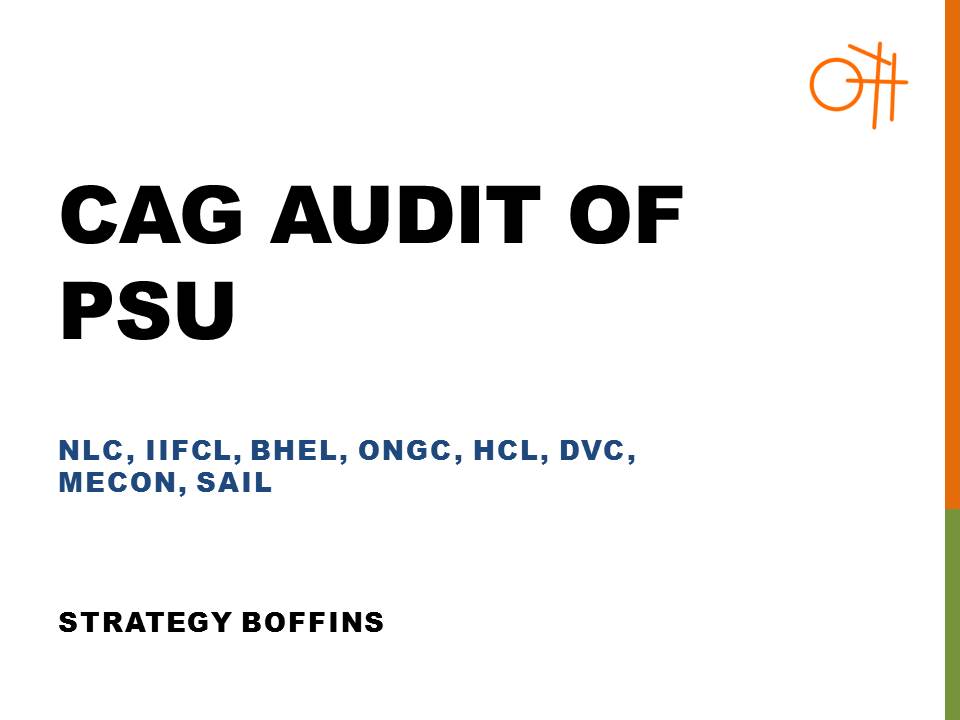Not proper Assessment of Requirements before Outsourcing
NLC India Limited entered into an outsourcing contract for lignite excavation in respect of Mine-II, while having enough lignite stock for both the Thermal Power Stations they were operating for the years 2015-16 and 2016-17. It resulted in expenditure of Rs 28.74 crore which was avoidable and overstocking of inventory and ultimately deterioration in the quality of lignite.
Poor Due-Diligence and Project Monitoring
India Infrastructure Finance Company Limited (IIFCL) provides long term finance to viable infrastructure projects. In road sector, the projects do not have physical assets to provide as security against loan. Viability of the project is the only comfort for securing the quality of loan asset.
Delay in work progress, risk of misuse of fund by promoters and avoidable additional loan to badly managed projects, poor monitoring of project progress etc. led to loan of Rs 1,895.50 crore to nine projects out of 32 projects examined in audit becoming NPA.
Poor Contract Execution
BHEL suffered a loss of Euro 3.83 million (Rs 28.35 crore) due to failure to deliver performance as per the contractual provisions and resultant invocation of bank guarantee by the client. Bharat Heavy Electricals Limited (BHEL) had entered into (21 April 2015) a contract with Electrik Uretim AS Genel Mudurlugu (EUAS), Turkey, for rehabilitation and upgradation of eight units of Keban Hydroelectric Power Plant at a price of Euro 63.86 million (approx. `472.56 crore) with completion period of 2,552 days (seven years approximately).
Poor Operational Performance
The Heavy Power Equipment Plant, Hyderabad of BHEL failed to avail 50 per cent rebate in sewerage cess on water charges, as extended by the Hyderabad Water Supply and Sewerage Board, which resulted in avoidable extra expenditure of Rs 21.24 crore during January 2012 to March 2019. The plant was eligible for a rebate of 50 per cent (i.e. 17.5 per cent) in sewerage cess for bulk consumers to encourage them to set up their own sewerage treatment plant, which BHEL failed to avail.
Poor investment Decision
Hindustan Copper Limited acquired Gujarat Copper Project (GCP) (erstwhile Jhagadia Copper Limited, Gujarat) without ensuring the availability of raw materials and the plant remained almost wholly unutilised since commissioning which led to unfruitful investment of Rs 303.18 crore and loss from operating GCP amounting to Rs 102.49 crore.
HCL was approached by the Asset Reconstruction Company (India) Limited, Mumbai (ARCIL) seeking the interest of the Company in the acquisition of the plant of Jhagadia Copper Limited (JCL), Gujarat which was closed since was September 2009 for want of working capital. Though apprised of the threats regarding operational aspects as well as constraints for availability of raw materials for the plant, HCL acquired (February 2015) JCL plant at a price of Rs 210 crore from ARCIL as a single bidder and renamed it as Gujarat Copper Project (GCP). The capacity utilization of GCP was only 20 percent of the total capacity of the plant during the period from November 2016 to March 2019 primarily due to non-availability of raw materials. As a result, HCL suffered a loss of Rs 102.49 crore during the above period by operating GCP. In the meantime, the Company made a total investment of Rs 303.18 crore in GCP (including acquisition cost) till March 2019.
Poor Implementation of ERP
Oil and Natural Gas Corporation Limited (ONGC) CAG Audit observed that data on location and custodian of assets was not properly populated in the master records and 571 ex-employees continued to be denoted in the system as custodians of assets valuing Rs 87.43 crore. Incorrect bank keys and duplicate vendor records were identified in vendor master. Further, Audit noted that repetitive payments were made to vendors classified as one-time vendors and overdue payments continued without any reason attributed in the payment block key (up to 1,096 days). Audit also observed that uniform practice is not followed across the Company for adoption of allocation of drilling costs.
ONGC initiated a project called Information Consolidation for Efficiency (ICE) in October 2003 to realign its business processes under a common Enterprise Resource Planning (ERP) system. Audit reviewed Accounts Payable, Asset Accounting and Cost Centre Accounting sub- modules of the Financial and Controlling (FICO) modules in Eastern and Northern regions of the Company in 2007. The findings of audit were included in the CAG’s Audit Report No.10 of 2008 (Chapter VII). The assurances provided during the previous audit were not acted upon. The current IT audit is a follow up audit on the recommendations of the previous report.
Failure to upgrade and create facilities within the approved time schedule
ONGC entered (April 2002) into a Memorandum of Understanding (MoU) with Indian Oil Corporation Limited (IOCL) and Bharat Petroleum Corporation Limited (BPCL) for sale of crude oil. The sale price was subject to discount at slab rates, in case Basic Sediment & Water (BS&W) content in the crude oil exceeded 0.2 per cent by volume.
The oil produced from Geleki, Lakwa, Rudrasagar and North Bank has high BS&W content, due to which further processing of crude oil is required to bring down the BS&W content level below 0.2 per cent before supply to the refineries. In this regard, Audit observed that Assam Renewal Plan was conceptualized way back in December 2005 with an estimated cost of Rs 2,465.15 crore. One of the major deliverables of the project was to control the BS&W level below 0.2 per cent. Though the project was scheduled to be completed in March 2013, the work is still on. Crude oil contained BS&W ranging from 0.164 – 0.417 per cent during April 2013 to October 2019 resulting price discount/ loss of revenue to ONGC amounting to Rs 27.06 crore.
Failure to utilize capacity after agreement
Decision of Damodar Valley Corporation towards reduction of the quantum of power of Power Purchase Agreements (PPAs) with Kerala State Electricity Board in respect of RTPS-I resulted in loss due to under-recovery of capacity charges, amounting to Rs 78.15 crore during the period May 2016 to March 2019. DVC entered into a PPA with Kerala State Electricity Board Limited (KSEBL) for supply of 150 MW from Raghunathpur Thermal Power Station-I (RTPS-I) for a period of 25 years. Due to increase in project cost, DVC and KSEBL mutually agreed (July 2015) to reduce the quantum of power from RTPS-I in respect of the above PPA from 150 MW to 50 MW and a fresh PPA for supply of 100 MW of power from its existing other units. However, no such PPAs were entered into with KSEBL. The scheduling of power from RTPS-I was commenced from May 2016. Thus, the Corporation was not in a position to recover capacity charges of Rs 78.15 crore from May 2016 to March 2019 in respect of RTPS-I corresponding to 100 MW of power from KSEBL. Additionally, the Corporation has to absorb recurring loss of Rs 3.53 crore per month till new consumer for purchasing of 100 MW of power is firmed up.
Poor coordination with foreign partners in Project execution
Delay in commencement of work by MECON Limited and inability to ensure submission of Bank Guarantee (BG) by its foreign associate, to execute External Coal Handling Plant Project awarded by NTPC, resulted in termination of contract and encashment of BG by NTPC and loss of Rs 42.26 crore to MECON.
NTPC Limited invited bids for External Coal Handling Plant (ECHP) for North Karanpura Super Thermal Power Project (NKSTPP) in January 2015. Since MECON Limited was not meeting the eligibility criteria for the above work, it arranged a pre- tender tie up with M/s Northern Heavy Industries Group Co Limited, China (NHI) and M/s JMC Projects (India) Limited (JMC) to submit the bid for above work. NTPC awarded the work of ECHP for NKSTPP to MECON in February 2017 at a cost of Rs 394 crore to be completed by June 2019. Delay in commencement of work by MECON Limited and inability to ensure submission of Bank Guarantee by its foreign associate, to execute External Coal Handling Plant Project awarded by NTPC, resulted in termination of contract and encashment of BG by NTPC and loss of Rs 42.26 crore to MECON.
Poor Safety Policy and Environment Management
CAG Audit examined records relating to safety policy and environment management of Steel Authority of India Limited (SAIL) for the period 2014-19 to assess the compliance to stipulated Act/ Rules/ Regulations and Standard Operating Practices (SOP) and whether social responsibilities related to environmental and pollution control, safety standards and application of the best industrial practices was followed. It was noted that SAIL Safety Organisation did not develop any plan or frame timeline to implement its recommendations. Out of 686 recommendations, 258 were yet to be complied.







